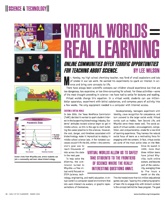Does real learning happen in virtual worlds? 
Cable in the Classroom Magazine published an article I wrote on this topic in their March issue.
The premise is:
“There have always been scientific concepts our children should experience that are too dangerous, too expensive, or too time-consuming for school. For these activities – some of the most thought provoking in science – we have had to settle for lectures and reading.
Virtual worlds change this equation. In a virtual world, students can use million dollar apparatus, experiment with lethal substances, and compress years of activity into a few weeks….”
The article goes on to describe how the Texas Workforce Commission is using Whyville as an outreach vehicle for biotechnology. It also addresses why virtual worlds are particularly attractive to tweens because of where they are developmentally.
If you have thoughts on what I wrote leave a comment here and I’ll respond.
Download the complete article (PDF) by clicking on the image to the right.
All the links referenced in the article are below the fold – continue reading to see them.
Links that were in the article.
“Don’t Bother Me Mom–I’m Learning!” (Marc Prensky)
Educational Games Research Blog
“Everything Bad is Good for You” (Steven Johnson)
Games + Learning + Society Conference
“How Computer Games Help Children Learn” (David Williamson Shaffer)
Remission (HopeLab)
Yasmin B. Kafai: Research on Classroom Use of Whyville
 The Education Business Blog
The Education Business Blog

